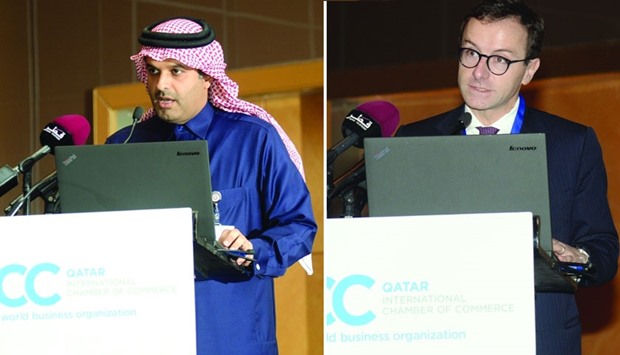Arbitration cases in Qatar, particularly in the country’s construction and energy sector, have increased from three in 2005 to 30 in 2015, ICC Court secretary general Andrea Carlevaris told Gulf Times.
Speaking at a recently-held conference, Carlevaris said the number is expected to increase in 2016 due fluctuations in oil prices.
Carlevaris explained that the growth in the number of arbitration cases brought to the ICC Court “may mean an increase in the local economy, particularly in the energy and infrastructure sectors.” He added: “But it also means that Qatari parties are relying on the ICC as a reliable dispute resolution mechanism.”
“These disputes probably existed also in the past but now we see that even international disputes are referred to the ICC Court of Arbitration,” he said.
This was reiterated by Qatar International Centre for Conciliation and Arbitration (QICCA) board member Sheikh Thani bin Ali al-Thani, who noted that aside from fluctuating oil prices, the influx different foreign companies in Qatar have increased the number of arbitration cases.
Sheikh Thani told Gulf Times that the cases received by QICCA are mostly from the construction sector: “Most of the cases we received were about delays in timelines, delivery of projects, and issues between the contractor and sub-contractors.
“Some ended in arbitration, mediation, and some cases underwent normal court proceedings. But there is an increasing trend in arbitration since many companies want to maintain a sense of privacy.”
Carlevaris also said: “The increase in dispute cases may also mean that there is more international business going on in Qatar, but also the parties are possibly shifting from court systems or local arbitrary institutions to international institutions such as the ICC. Also, the ICC arbitration system is considered reliable, not only by international investors in Qatar, but also by the Qatari private and public sectors.”
He added: “I would say the construction and energy sector almost exhaust the Qatari cases.”
Asked if the ICC Court expects to receive more disputes this year, Carlevaris said: “The fluctuations in the oil prices have been a significant factor in the growth of arbitration cases. These are typically sources of disputes.”
Today, Carlevaris said energy disputes constitute a large portion or almost 20% of legal disputes that go to the ICC Court. “The disputes that go to the ICC Court involving energy claims have seen a very significant increase in recent years,” he said.
He added that energy disputes rank second after construction and infrastructure disputes, which is another popular sector in Qatar.
“The increase in arbitration cases concerns the whole region, but it is particularly prevalent in Qatar. Other neighbouring jurisdictions have also shown a similar increase in cases but not as high in Qatar,” he said.

Qatar International Centre for Conciliation and Arbitration (QICCA) board member Sheikh Thani bin Ali al-Thani (L) and ICC Court secretary general Andrea Carlevaris(R) speak at the conference. PICTURE: Noushad Thekkayil
